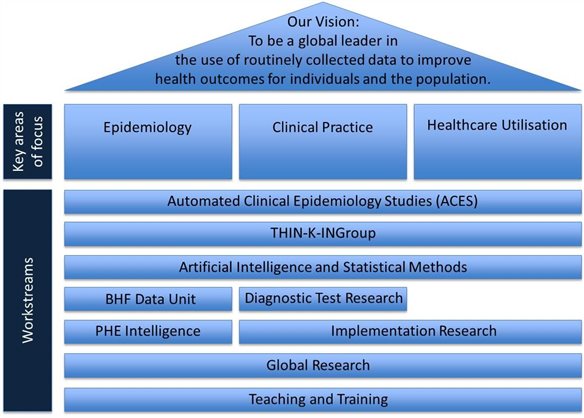Health Informatics vision: to be a global leader in the use of routinely collected data - improving health outcomes for individuals and the population.
The College of Medical and Dental Sciences at the University of Birmingham has a strong track record in research and education in health informatics.
The Health Informatics team based within the Institute of Applied Health Research has access to several key healthcare data sources including:
-
GP data from The Health Improvement Network data (THIN)
-
National Hospital Episode Statistics
-
Local detailed hospital data from the Prescribing Information and Communication System (PICS, provided by University Hospital Birmingham)
-
Numerous surveillance data through Public Health England
The Health Informatics Team has recently expanded to include expertise in implementation science, diagnostic test research, artificial intelligence and machine learning. This has created an opportunity to take a whole systems-based approach to using routinely collected data to improve health outcomes.
How to achieve the vision:

Focusing on 3 key areas:
- Epidemiology – developing methodologies and carrying out high quality epidemiology studies to identify factors that influence health outcomes
- Clinical Practice – working with clinicians to create tools and approaches to transform clinical guidance and practice
- Healthcare Utilisation – evaluating the effectiveness of service improvements in improving patient and system outcomes, and using this to drive changes across the health and care system
These 3 key areas to be delivered by work-streams which bring together HI expertise and enable effective collaboration.
Aim:
To collate, link and use routinely available electronic health and social care data to understand factors that influence health at an individual and population level, and to use this information to inform clinical decision-making and healthcare policy.
Objectives:
- To promote and facilitate standardized data collection in electronic health and social care records
- To enhance research through connecting datasets from relevant biological (genomics, proteomics, metabolomics etc), clinical trials, epidemiological cohorts and geo-spatial and social determinant data
- To use routine data for epidemiological, clinical and health service research
- To develop innovative methodologies in the analysis of routine data
- To develop and test novel decision support tools that will standardise care, provide patient-specific therapies and pave the way to monitor individual patient response